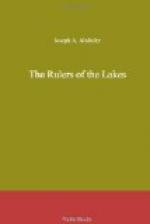“They stopped here and talked together a little while,” he said, when they had been following the trail about two hours. “They stood by the side of the path. Their footprints are gathered in a group. They knew by the wagon tracks that white settlers, fleeing, were ahead of them, and they may have thought of turning back to see who followed. That is why they drew up in a group, and talked. At last they concluded to keep on following the train, and they cannot be more than a half hour ahead now.”
Willet knelt down for the first time, and examined the traces with the greatest care and attention.
“The leader stood here by this fallen log,” he said, “He had big feet, as anybody can see, and I believe I can make a good guess at his identity. I hope to Heaven I’m right!”
“Whom do you mean?” exclaimed Robert eagerly.
“I won’t say just yet, because if I’m wrong you won’t know the mistake I’ve made. But come on, lads. ’Twill not take long to decide the question that interests us so much.”
He led the way with confidence, and when they had gone about a mile he sank down in a thicket beside the trail, the others imitating him. Then the hunter emitted a sharp whistle.
“I think I’ll soon get an answer to that,” he said, “and it’ll not come from French or Indian.”
They waited a minute or two and then the whistling note, clear and distinct, rose from a point ahead of them. Willet whistled a second time, and the second reply soon came in similar fashion.
“Now, lads,” he said, rising from the bush, “we’ll up and join ’em. It’s the one I expected, and right glad I am, too.”
He led the way boldly, making no further effort at concealment. Robert saw outlined in the moonlight on a low hill in front of them a group of fifteen or sixteen white men, all in hunter’s garb, all strong, resolute figures, armed heavily. One, a little in advance of the others, and whom the lad took at once to be the leader, was rather tall, with a very powerful figure and a bold, roving eye. He was looking keenly at the approaching group and as they drew near his eyes lighted up with recognition and pleasure.
“By all that’s glorious, it’s Dave Willet, the Great Bear himself, the greatest hunter and marksman in all the northern province! Of a certainty it’s none other!”
“Yes, Rogers, it’s Willet,” said the hunter, extending his hand, “though you complimented me too prettily. But glad am I, too, to see you here. You’re no beauty, but your face is a most welcome sight.”
Then Robert understood. It was Robert Rogers from the New Hampshire grants, already known well, and destined to become famous as one of the great partisan leaders of the war, a wild and adventurous spirit who was fully a match for Dumas and Ligneris or St. Luc himself, a man whose battles and hairbreadth escapes surpassed fiction. Around him gathered spirits dauntless and kindred, and here already was the nucleus of the larger force that he was destined to lead in so many a daring deed. Now his fierce face showed pleasure, as he shook the hunter’s powerful hand with his own hand almost as powerful.




